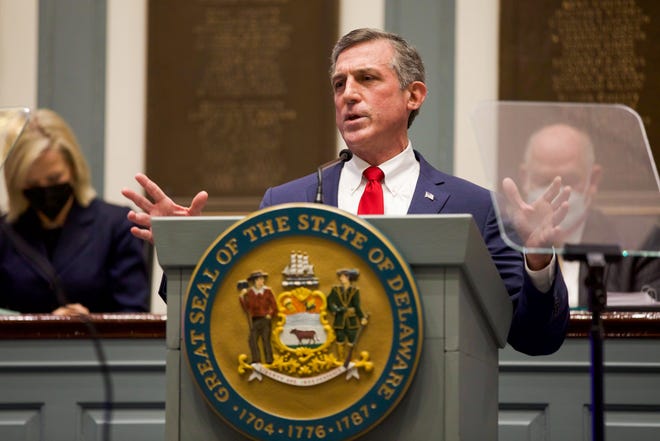Gov. John Carney promised to invest in schools, jobs and infrastructure in 2022 during his annual State of the State address delivered Thursday in the House chamber of Dover’s Legislative Hall.
Carney began his speech, the fifth of his tenure, acknowledging the nearly two years of sacrifices and loss that Delawareans have endured during the COVID-19 pandemic.
“If nothing else, we all have that in common,” Carney said. “And as we’ve learned the hard way over the past few weeks, we aren’t through it yet.”
When he gave the same speech two years ago, a crowd of lawmakers and other officials were beaming in that same House chamber over a projected $200 million surplus in revenue and ambitious promises on how to spend the money.
Those 2020 promises were not fulfilled once the virus took its toll on the economy and, in turn, state revenues. But now, lawmakers expect an even more generous revenue forecast this year of $800 million. Carney is expected to release his spending plan next week.
Thursday’s speech was given to a room of lawmakers wearing KN-95 and N-95 masks. The event was largely closed to the public but streamed online.
There were few if any surprises and much of what Carney mentioned in his speech has been announced or promised in previous press conferences.
However, the biggest theme on Thursday was economic development despite the imminent threat of the omicron variant.
Early in his speech, he thanked the Delaware National Guard and public health officials for addressing the ongoing pandemic, which has reached all-time highs and was overwhelming Delaware hospitals as Carney stood at the podium. The day before, lawmakers had passed a bill to shorten the nursing certification requirement by 59 hours to hasten the deployment of nurse assistants to facilities struggling with staff shortages.
But job access and infrastructure appeared to be top of mind. Carney said expanding economic opportunity for Delaware families “must be job number one.”
Here are eight takeaways from the address:
WATCH SPEECH:Delaware Gov. John Carney gives his State of the State speech
READ SPEECH:Read Delaware Gov. John Carney’s full State of the State address
1. Filling jobs

Delaware’s unemployment rate is just over 5 percent compared to the high of 13.4 percent in April 2020, Carney said – part of a rebound quicker than “we could’ve imagined.”
But because filling jobs is still a dilemma (local employers have more than 33,000 open positions compared to 26,000 residents looking for work), the state plans to spend $50 million in federal stimulus funds to “strengthen our workforce training programs,” Carney said.
Most of that money will go to Forward Delaware, a program to help people who lost work during the pandemic get training and hiring opportunities in industries where workers are in demand such as health care, building trades, food services, transportation and tech. Carney’s administration created Forward Delaware in 2020 with federal CARES Act money. They announced in October that they’ll use $40 million in American Rescue Plan aid to beef it up.
The state will also spend $8.3 million on a $15.8 million public-private expansion of Delaware’s Pathways, a program created in 2015 that helps students gain “real-world work experience” while in school. It serves about 20,000 high schoolers.
By 2023, those investments will expand the Pathways program to reach more than 6,000 middle school students and 80 percent of high school students, Carney said.
Carney also promised to include in his spending plan next week a plan to support low-income state employees.
SHORTENED NURSE CERTIFICATION:Facing staffing shortage, Delaware lawmakers move to shorten nurse assistant certification
2. Federal money brings new spending opportunities
Carney also took time to praise the federal monies from President Joe Biden’s administration and Congress, which most recently gave more than $1 billion to Delaware via the Infrastructure Investment and Jobs Act.
“In terms of national and international attention, it certainly doesn’t hurt to be home of the President of the United States,” Carney said.
Carney didn’t offer dollar amounts, but he did allude to some spending items.
Among the things they plan to spend money on are building and upgrading libraries, modernizing nonprofits’ buildings, increasing resources for Wilmington and Dover’s gun violence prevention programs, improving mental health services, repairing roads and bridges, investing in public transit, building more electric vehicle infrastructure and climate action.
Carney also said the state plans to “supercharge” its largest infrastructure plan.
3. Businesses coming to Delaware

Carney praised several arriving businesses that he said present employment opportunities.
He named the financial tech startup Investor Cash Management, which announced in December that it will move to Wilmington from Chicago. The company plans to spend $15 million on its new headquarters downtown and create almost 400 new jobs, Carney said.
Carney also pointed to Prelude Therapeutics, a company focused on innovative cancer treatment, that recently signed a 13-year lease for a new headquarters at DuPont’s old Chestnut Run campus.
He also pointed to Incyte, a biopharmaceutical company that has nearly finished its Wilmington building meant to hold 500 employees.
The Baltimore-based textile manufacturer Avalon Industries is relocating in Dover, Miller Metal is adding jobs in Bridgeville, and WuXi STA Pharmaceuticals plans to add 500 jobs and a half a billion dollars in capital investment at a “massive” new manufacturing facility in Middletown, Carney said.
MARIJUANA LEGALIZATION:Will marijuana ever be legal in Delaware? New attempt hoping for more lawmaker support
4. New school construction, a push to revamp Wilmington schools
Carney promised to spend more than $300 million in the next two years on school construction “from Wilmington to Dover to Georgetown.”
Carney also advocated for the creation of the “Wilmington Learning Collaborative,” which would include a new governing board and partnership among the Christina, Red Clay and Brandywine school districts to better the city’s education system.
Carney said Wilmington’s children “are not getting the education they need to be successful in life,” and that the collaborative is based on successful models in other parts of the U.S. that gives more decision-making power to educators and local communities.
5. Support for paid family leave
Gov. John Carney showed his support for a bill to create a statewide paid family and medical leave insurance program.
Carney and business leaders were initially hesitant of the idea when Sen. Sarah McBride, a Wilmington Democrat, introduced it last year. McBride plans to introduce a new version of the bill this year that will include amendments based on feedback from stakeholders, including from the business world. Carney’s support means it will likely pass.
“It’s the right thing to do – and it will make Delaware more attractive for younger workers,” Carney said.
MEDICAL AID IN DYING:Delaware House committee clears bill allowing terminally ill people end their own lives
6. Housing
Using federal funds, the State Housing Authority is partnering with the private sector to rebuild the Riverside community in northeast Wilmington, Carney said.
In October, officials announced that the state will give $26.4 million of federal funds to an existing Riverside neighborhood revitalization project run by the nonprofit REACH Riverside. The money is meant to help build 350 affordable homes in two years, they said.
Carney promised to invest federal dollars over the next three years to “revitalize and develop” more than 1,200 affordable housing units in Kent and Sussex counties.
The state will also expand down payment and settlement assistance for homebuyers, and the Housing Authority has allocated $50 million for rental and mortgage assistance, Carney said during his speech.
7. Internet access
The state plans to spend more than $100 million in federal money to give more people internet access, mostly in Kent and Sussex counties.
State officials claimed in an August document to the federal government that the investment will make Delaware the first state to “close every last mile of connectivity statewide.”
Close to 11,600 Delaware homes and businesses don’t have high-speed broadband access, Carney said on Thursday.
SEN. DARIUS BROWN’S ETHICS INQUIRY:NAACP demands end to punishments of Sen. Darius Brown, threatens to sue over ethics probe
8. Spending plan will look a lot like past years

Carney’s spending plan, which he is expected to release next week, will look a lot like his past spending plans as governor: Dedicating extra revenue to one-time expenses while also putting some away into savings for less fortunate years.
Carney promised to use the extra revenue to “continue the largest infrastructure program in Delaware history.” In 2021, he signed the largest bond bill in Delaware history at $1.3 billion, which was nearly double the $708 million bill he signed in 2020.
On Thursday, Carney also promised no budget cuts, no tax increases and no layoffs to state employees.
He also promised to expand Opportunity Funding, which Carney created in 2018 to give schools additional funding for English learners and low-income students. In October 2020, the state reached a legal settlement making “opportunity funding” a permanent fixture in how the state allocates tax dollars for students.
The investments are possible in part thanks to Biden’s infrastructure spending bill, he said.
“With these investments, we’ll strengthen our economy, expand opportunity, and support families as we finally emerge from this pandemic,” he said.
Sarah Gamard covers government and politics for Delaware Online/The News Journal. Reach her at (302) 324-2281 or sgamard@delawareonline.com. Follow her on Twitter @SarahGamard.
WHAT TO EXPECT FROM 2022 SESSION:Here’s what to expect from Delaware’s 2022 legislative session
COVID-19 MASKS:Delaware plans to distribute 125K masks to teachers, older students, to combat COVID cases